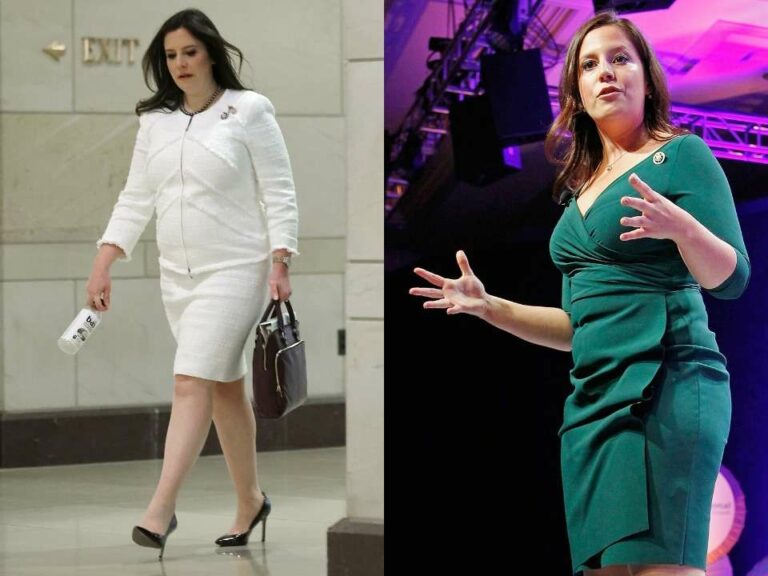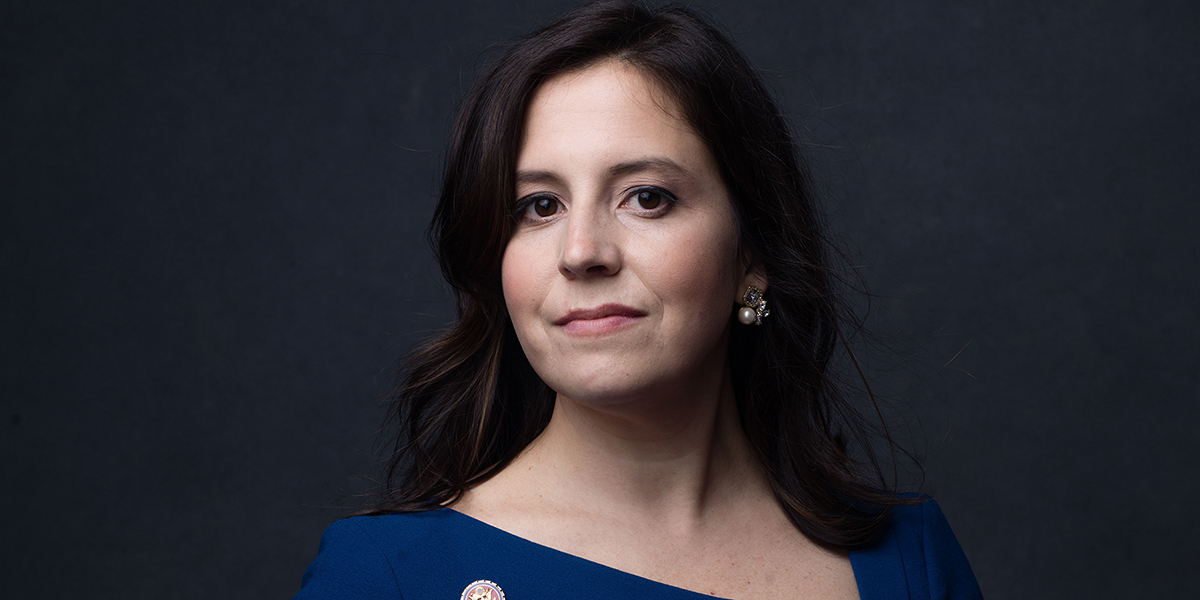Is Elise Stefanik Catholic? Exploring Her Religious Beliefs And Background
Elise Stefanik's religious background has been a topic of interest for many, especially as she continues to rise in prominence within American politics. Understanding her faith is key to analyzing her values and principles. This article delves into whether Elise Stefanik is Catholic and explores the nuances of her religious beliefs.
Born into a family with strong values, Elise Stefanik's personal and professional life often reflects her upbringing. Her religious beliefs play a significant role in shaping her worldview, influencing her decisions as a politician. As we explore this aspect, we aim to provide clarity on her connection to Catholicism.
This article will comprehensively examine Elise Stefanik’s religious affiliations, including her faith practices, public statements, and how her beliefs align with Catholic teachings. Whether you're a political enthusiast or simply curious about her background, this article offers valuable insights.
Read also:Lakeside Collection Your Ultimate Guide To Stylish And Affordable Fashion
Table of Contents
- Biography of Elise Stefanik
- Elise Stefanik's Religious Background
- Is Elise Stefanik Catholic?
- How Her Values Align with Catholicism
- Family Influence on Her Faith
- Public Statements on Religion
- Impact of Religion on Her Politics
- Common Misconceptions About Her Faith
- Comparison with Other Politicians
- Conclusion
Biography of Elise Stefanik
Elise Stefanik, born on June 26, 1984, in Rochester, New York, is a prominent American politician and a member of the Republican Party. She currently serves as the U.S. Representative for New York's 21st congressional district. Her career in politics began when she worked for the White House during George W. Bush's administration.
Stefanik earned her Bachelor of Arts degree in government from Harvard University in 2006. Her academic achievements and early career roles laid the foundation for her political ambitions. Below is a brief overview of her personal details:
Elise Stefanik's Personal Information
| Full Name | Elise Marie Stefanik |
|---|---|
| Date of Birth | June 26, 1984 |
| Place of Birth | Rochester, New York |
| Education | Harvard University (B.A., 2006) |
| Occupation | U.S. Representative, Republican Strategist |
Elise Stefanik's Religious Background
Elise Stefanik's religious background is deeply rooted in her upbringing. Growing up in a family that valued faith, she was exposed to various religious teachings from a young age. Her parents instilled a sense of spirituality and moral responsibility in her, which has influenced her life and career choices.
Religious Practices
While Stefanik’s public statements often emphasize her commitment to faith, the specifics of her religious practices remain somewhat private. However, her public service and advocacy reflect her dedication to principles often associated with Christianity.
- She frequently participates in community service initiatives tied to religious organizations.
- Her speeches often include references to faith and its role in shaping her worldview.
Is Elise Stefanik Catholic?
Elise Stefanik is not Catholic. She identifies as an Episcopalian, a denomination within Christianity that shares some similarities with Catholicism but maintains distinct theological and liturgical practices. Despite this, her faith aligns with many values upheld by the Catholic Church, such as pro-life advocacy and family values.
Her Episcopalian faith has been a guiding force in her political career, influencing her stance on social issues. While she may not be Catholic, her beliefs resonate with many Catholics on key policy matters.
Read also:Roc Nation Net Worth A Comprehensive Guide To The Music Empires Financial Power
How Her Values Align with Catholicism
Although Elise Stefanik is not Catholic, her values often align closely with Catholic teachings. Her positions on issues such as abortion, education, and social justice reflect a commitment to principles shared by both Episcopalians and Catholics.
Key Alignments with Catholic Teachings
- Pro-Life Advocacy: Stefanik is a strong advocate for pro-life policies, a stance that aligns with Catholic teachings on the sanctity of life.
- Family Values: Her emphasis on traditional family structures mirrors the Catholic Church's stance on family and marriage.
- Social Justice: Stefanik's support for policies aimed at reducing poverty and promoting equality resonates with Catholic social teachings.
Family Influence on Her Faith
Elise Stefanik’s family played a pivotal role in shaping her religious beliefs. Her parents, both Episcopalian, instilled in her a strong sense of faith and moral responsibility. Growing up, she attended Episcopal services regularly and participated in church activities.
Her family's influence extends beyond religious practices, as it also shaped her commitment to public service and community involvement. This foundation has been instrumental in her political career, where she consistently advocates for policies that reflect her faith-based values.
Public Statements on Religion
Elise Stefanik has made several public statements about her faith, emphasizing its importance in her life and career. In interviews and speeches, she often highlights how her religious beliefs guide her decision-making process as a politician.
Notable Quotes on Faith
- "My faith is a guiding force in everything I do, from my work in Congress to my involvement in my community."
- "I believe that faith and public service go hand in hand, and I strive to reflect that in my actions every day."
These statements underscore her commitment to integrating her faith into her public life, reinforcing the influence of her religious beliefs on her political career.
Impact of Religion on Her Politics
Elise Stefanik's religious beliefs have a significant impact on her political decisions. Her faith informs her stance on various issues, including healthcare, education, and social welfare. As a result, her policies often reflect a commitment to values shared by both Episcopalians and Catholics.
Policy Examples
- Healthcare: Stefanik supports policies that prioritize access to affordable healthcare while respecting religious freedom.
- Education: She advocates for educational opportunities that align with her faith-based values, including support for school choice initiatives.
- Social Welfare: Her proposals often aim to address poverty and inequality, reflecting her commitment to social justice.
Common Misconceptions About Her Faith
There are several misconceptions about Elise Stefanik's religious beliefs, particularly regarding her connection to Catholicism. While she shares many values with Catholics, her Episcopalian faith is distinct in its theology and practices.
Clarifying Misunderstandings
- Religious Denomination: Stefanik is Episcopalian, not Catholic, despite their shared values on certain issues.
- Political Alignment: Her alignment with Catholic teachings on social issues does not imply a direct affiliation with the Catholic Church.
Understanding these distinctions is crucial for accurately interpreting her religious and political views.
Comparison with Other Politicians
Elise Stefanik's religious beliefs and their influence on her politics can be compared to other prominent politicians. Like many conservative leaders, her faith plays a central role in shaping her policy positions. However, her Episcopalian background sets her apart from Catholic politicians who may share similar views.
Similarities and Differences
- Similarities: Shared commitment to pro-life policies and family values with Catholic politicians.
- Differences: Distinct theological perspectives and liturgical practices as an Episcopalian.
This comparison highlights the diverse ways in which faith influences political leadership across different denominations.
Conclusion
Elise Stefanik's religious beliefs, though rooted in Episcopalianism, align closely with many Catholic teachings. Her faith shapes her political decisions and informs her commitment to values such as pro-life advocacy, family values, and social justice. Understanding her religious background provides valuable insights into her worldview and political priorities.
We encourage readers to explore these topics further and engage in discussions about the intersection of faith and politics. Share your thoughts in the comments below or explore other articles on our site for more in-depth analyses of political and religious issues.

